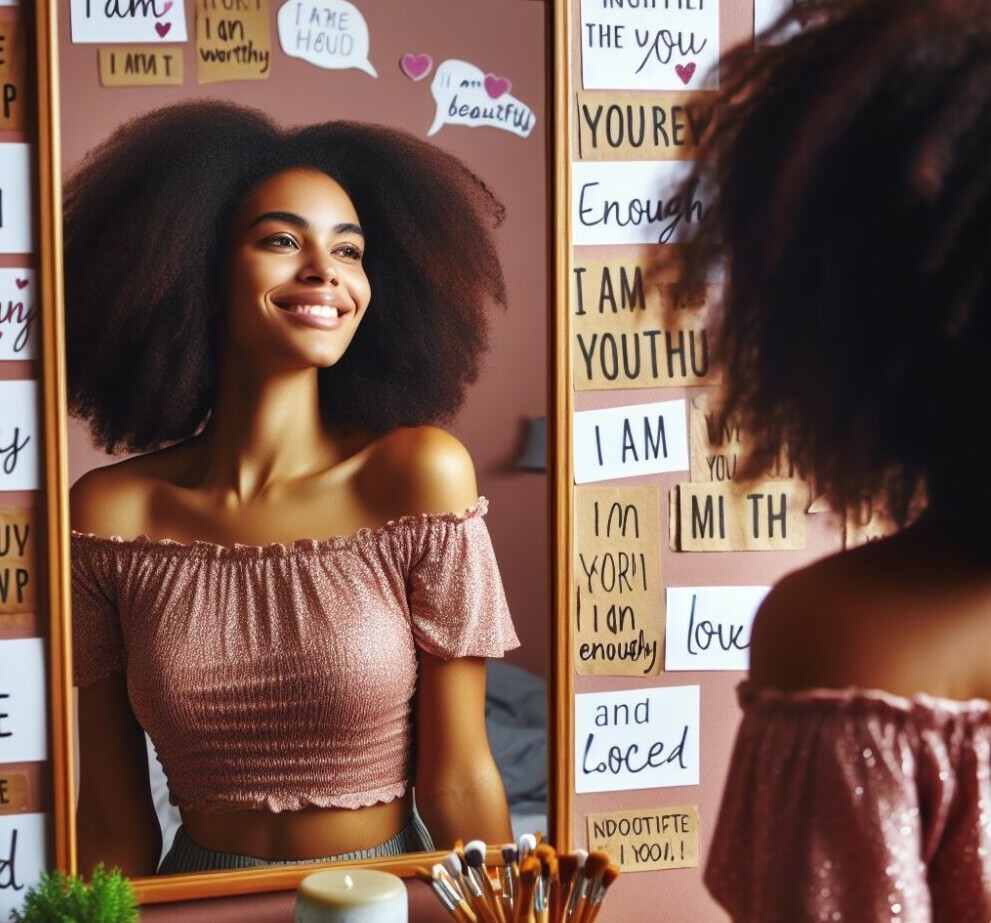
Love At The Core
We are all born with love at our core and so learning how to love yourself shouldn’t be that difficult however that isn’t the case. As we grow older and experience life we tend to lose our sense of self along the way and so this very natural way of being becomes a challenge and more so while we are in a relationship.
In a relationship, it’s easy to get carried away caring for someone else’s needs and to forget about your own. However, self-love is a non-negotiable part of a healthy partnership. I had to learn that the hard way.
Looking back on my previous relationships, I found myself defining my worth through my partner’s eyes, constantly seeking their validation. It took me a while to understand that my sense of self-worth had to come from within, not from someone else.
The Revelation
I remember the exact moment I realized the importance of self-love in a relationship. One evening, as an ex and I, were discussing our future plans, it hit me that all my aspirations were tied to us as a couple, none just for me or exactly what I personally initiated.
That night, I began to reassess what my values were and why I had pushed them to the curb. This introspection involved looking inward and acknowledging my own needs and desires. This shift didn’t happen overnight—it took dedicated effort and being honest with myself.
Identifying Your Needs
When you live in a partnership, sometimes your partner’s need might blur the lines of yours making it feel like you are catering for both of you because you making them happy makes you happy. However, the danger here might be that their approval has now become what makes you happy and not the fact that you genuinely have the same needs.
If you’re unsure where to start with finding what your specific needs are, consider setting aside time each day to reflect. Write down what you love about yourself and what makes you unique. These moments of introspection can build a stronger foundation for self-love. Please if you are already thinking you don’t have the time remember setting aside time for your reflection is another form of self-love.
Acknowledging Your Worth
When you have your list and don’t be ashamed or intimidated by what your personal needs and desires are. Allow yourself to hosetly put everything down in your reflection, remember this is your personal space so be daring and honest with yourself and accept whatever your heart desires.
Acknowledging your own worth is the first step on this path. For me, learning to celebrate my to love all the parts of me that I didn’t like at first or tried to hide, was essential. Whether it was my kinky afro hair or my rounded hips or simply accepting my unique accent, recognizing and accepting my differences helped build a relationship with myself that was just as important as the one with my partner.
It meant learning to love in a totally different way and that is something else. Learning to love me even when i didn’t feel loveable, also on days when all I wanted to do was not get up or face anyone. My love for myself was founded in deep self compassion where I always reminded myself what the little me would love at this moment.
Some of these moments manifested in forms of me starring at myself in the mirror and affirming my worth or giving myself a hug yes seriously. The practices have taken time and everyday I learn to show myself an act of kindness to really ground my love for myself.
Maintaining this balance between self-love and being in love is key to not losing yourself in a relationship. Through my journey, I’ve realized that loving myself allows me to bring a much richer version of myself to the relationship.
When you have a great sense of self-love, you’re ready to elevate not just your own life but the life you share with your partner. For me this journey has been filled with a lot of self-compassion and self-care, so making my self-care days a priority and not a “when I have time” task has been key.

Crafting a Self-Care Routine That Fits You
When it comes to self-care, I once believed it was all about bubble baths and scented candles and i remember my own research on the internet about “how to love yourself” bringing up results like “go to the spa”, “buy yourself something nice” etc. These were all very cliché and not very practical for everyone. But I’ve since learned that self-care is deeply personal and can mean different things for different people.
What if I don’t enjoy the spa as much as I enjoy bouldering? Or what if I am not in the right headspace to enjoy going out and buying something nice for me? Because I seriously wasn’t in the right headspace at that time. All these questions plagued me so I set out to find out what taking care of myself would mean and look.
Finding What Matters To You
It was about whatever makes me feel refreshed, valued, and centred. For me, it’s the quiet morning hours journaling after my devotion followed by my gym session and the occasional spontaneous baking just because.
As I mentioned above self-care will look different from person to person as you can see one of mine is baking whereas this is an absolute hell for my sister. So, my suggestion is to find what makes you lose track of time and is your happy place. Don’t let others define your way of taking care of yourself because your self-care needs to match with your unique needs and lifestyle, not someone else’s definition.
If you’re struggling to find a self-care routine, start by asking yourself what activities leave you feeling good. It can be as simple as taking a walk or as involved as learning a new language. Remember, what works for me might not work for you, and that’s okay. Self-care is about finding joy in the activities that cater to your personal well-being.
Make Yourself A Priority
Knowing that life will happen it will be a good idea to actually schedule these times in your calendar so they are not forgotten or fall off the priority list. Even on days when I’m not feeling up to it, sticking to my routine pays off by reinforcing a pattern of prioritizing myself. It’s a practice that accumulates over time, boosting your mood and energy along the way.
My morning devotion, journaling and gym sessions are so much a part of my life that on days I skip this due to travel, illness or something else I am not as organised and focussed throughout the day.
Building on a self-care routine sets the stage for cultivating self-confidence, which is another important aspect of loving yourself in a relationship. Nurturing yourself routinely is a critical foundation for developing the inner strength that’s essential for a strong sense of self-worth.

Building Self-Confidence
Your Silent Cheerleader
Self-confidence is a treasure that we build within ourselves than can is a gift in all aspects of our lives. Within our romantic partnership, our self-confidence is a quiet cheerleader, empowering us to be who we truly are and know what we really want.
We might ask what does self-confidence in a relationship look like? It’s about being able to voice your opinions, celebrating your accomplishments, and firmly believing in your worth, even when you’re sharing your life closely with someone else.
How It Started For Me
My path to strengthening my self-confidence while in a relationship has been a transformative experience. I never thought I was the spontaneous type but being upported by my partner, I dared to try new things and pushed the boundary of my comfort zone.
I recall the first time I tried to start a previous business and didn’t feel confident to approach suppliers, I looked myself in the mirror and gave myself a peptalk then i picked up the phone and made calls, booked appointments and by the end of the day I had 5 suppliers willing to work with me.
In my previous relationships I would have relied on my partner helping me out with most of these but the love I have developed for myself makes me feel worthy of asking and going for the things I desire. I remember my partner cheering me on and though that was another healthy boost to my ego I knew I had done the work by creating space for myself to feel worthy of the things I desired.
A Practice of Compassion
Building self-confidence like any of these other practices is a slow and sometimes tough journey but one important thing I always remind myself of is – how will i treat my little sister in this situation? That compassion I will show is what I then nurture myself with.
If you’re looking to strengthen your own self-confidence, start by practising self-compassion. Embrace your imperfections and celebrate your strengths. Set small, achievable goals that align with your values and take pride in reaching them.
It is worth noting that, self-confidence is like a muscle; the more we use it, the stronger it becomes. Creating opportunities that challenge me then acknowledging every little win has been one of the biggest motivators for me. Over time, these wins accumulate into a powerful sense of self-assurance.
The Ripple Effect
Your growing self-confidence doesn’t just benefit you it can lead to a more harmonious and dynamic relationship. As my confidence grew, so did the state of harmorny between my partner and me. We learned to rely on each other’s strengths and to approach conflicts with a mindset of resolution, not resignation. This is where the magic happens as your relationship can transform into a reinforcing structure for both your individuality and your shared goals.
Cultivating this balance flows seamlessly into respecting each other’s needs for personal space and autonomy. As you build your self-confidence, the concept of setting boundaries becomes not just necessary, but a natural progression in fostering self-respect and love. There’s an art to doing this without alienating your partner, and it begins with healthy communication and mutual understanding.

Setting Boundaries Is The Foundation of Self-Respect and Love
I’ll never forget the moment I realized how crucial setting boundaries is to not just maintaining a sense of self in a relationship, but actually deepening self-love. Initially, I saw boundaries as barriers—walls I was putting up that might keep my partner out or show my disinterest. But that’s not what they are at all. I’ve learned that boundaries aren’t about creating distance rather they’re about building respect, starting with self-respect.
Finding The Courage
When I finally mustered up the courage to set my first boundary in a relationship, I was nervous. I had to express to my partner that I needed designated time alone to recharge. I had always gone along with what previous partners wanted in the past never stopping to look, feel and express my emotions.
So, when I was single one of the things I did for myself was have a Me-Day one day in the weekend where I put away all electronics and did no socialising. When I started dating I promised to still keep that promise to myself so when I told my partner what he could expect on those days I wasn’t expecting his reaction.
Honestly, I worried this would come off as rejecting or cold. To my surprise, it wasn’t just accepted; it was supported. The feeling was like taking a breath after not realizing you were holding it. I use this particular day as a day of self reflection just with my journal and pen
How To Set Boundaries
So, how do you start? One way is to spend some quiet time reflecting on your needs and values. Write them down if that helps. Then, communicate them clearly and respectfully to your partner. Practical tip: practice what you want to say ahead of time. Make sure you’re conveying the importance of these needs, without sounding accusatory.
It’s essential to understand setting boundaries is something we will have to do at everystage and in every relationship. It’s an ongoing process that evolves as you and your respective needs change. The key is being able to articulate and maintain them with consistent communication. I’ve found that regular check-ins about what’s working and what’s not for me help keep both my boundaries and my relationship healthy.
Setting Boundaries Is Respecting Yourself
As challenging as learning to set boundaries can be when you muster this you not only build more self-confidence but you also show how much you value yourself. I always pat myself on the shoulder when I set a boundary either for myself or with another person as it reinforces the love and respect I have for myself.
When I know my limits are respected, I naturally feel more valued. This, in turn, strengthens the relationship I have with myself and my partner. After all, a partnership that is built on mutual respect and understanding has a solid foundation for growth. And when there’s mutual respect, it’s easier to encourage each other in your personal growth journeys, all the while growing closer rather than apart.

Celebrating Your Individuality
I have had experiences where I had lost myself in a relationship to the point of not having my own activities or projects. My turning point was when a former partner made a rude comment about me not having any friends because I was always hanging around with him.
What I had perceived as spending time with him had been used against me and from then I decided to always have my own activities no matter what and to prioritse them as well. I have never regretted making this decision because it turns out having my own stuff and achieving my own goals makes me more attractive than I could ever imagine.
I remember the feeling of achievement when my own relationship reached a new level of depth. This came from not just loving each other but embracing our respective personal growth and individuality. It was the realization that together, we were stronger, precisely because we took the time to nurture our individual strengths and passions.
Summing It Up
Relationships are like cups; They need both individual attention and shared care to overflow. Throughout this article, I’ve shared how vital it is to fill our own cup of self-love, even as we cultivate a shared space with your partner. When we understand and appreciate our own worth, we bring an invigorated self to the relationship, encouraging a more profound connection.
These principles shared may seem straightforward, but they require consistency and genuine effort. A supportive partnership means encouraging each other to pursue personal goals, interests, and self-improvement, while also being present and engaging in the relationship. Remembering that growth is not a race we need to learn to be compassionate with ourselves and our partners.
It’s my hope that the practical suggestions shared here will serve as a guide for you to reflect on your own journey in self-love within the framework of your relationships. Take what resonates with you and start small if you need to. Every step towards loving yourself is a step towards enriching the love you share with your partner.
Why not start today? Assess where you are in your journey, have an open discussion with your partner, and take a step forward together. If you need more help or accountability to deepen your love for yourself get in touch. You can also leave a comment or register for our newsletter to join our Self-Worth Journal community where I share more resources and updates on courses.
Love & Light
Sheila Daisy




